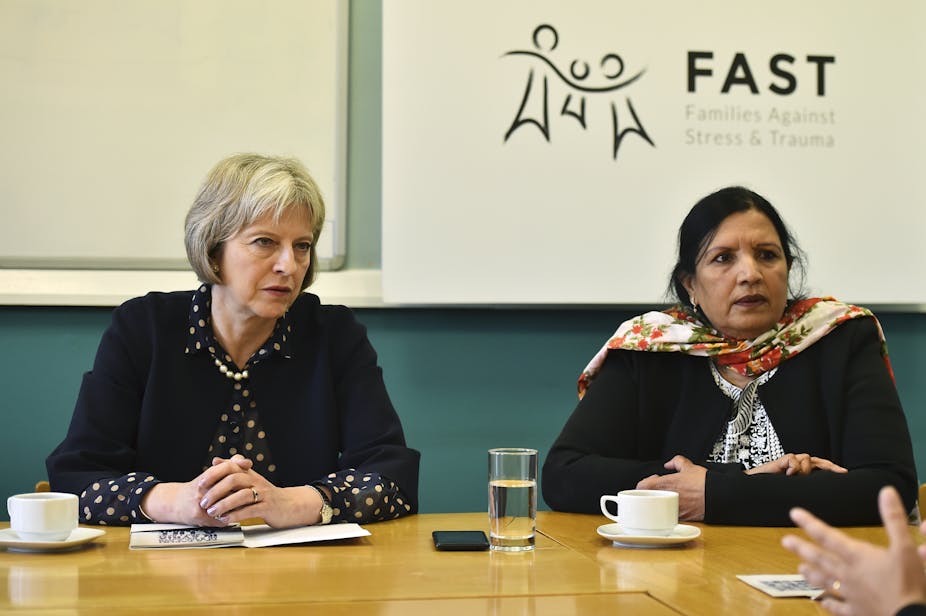The ink is barely dry on the British government’s Counter-Terrorism and Security Act, yet it has decided to launch a new counter-extremism strategy.
We Must Do Something syndrome, it appears, has struck again. Counter-terrorist legislation is passed almost as frequently as the average Premier League club changes its manager.
This latest plan includes a number of different proposals, but most are incredibly vague. There will be a review of public institutions to weed out extremists, police triggers to ensure robust investigations into reports of extremism, and closer scrutiny of the media to ensure extremists are not given a platform to air their views. All this is supposed to apply to all kinds of extremism – not just of the Islamic variety – but looking at what detail there is makes that difficult to believe.
What exactly is extremism?
One of the biggest problems with this plan and any legislation that will arise from it will be how you define in law what extremism actually is. In this latest policy, the government describes extremism as:
The vocal or active opposition to our fundamental values, including democracy, the rule of law, individual liberty and the mutual respect and tolerance of different faiths and beliefs. We also regard calls for the death of members of our armed forces as extremist.
The point of counter-terrorism legislation is to “defend further up the field” – that is, to prevent attacks before they happen. The plan now seems to be to push that defence further up the field than ever before.
Take for example the idea of reviewing public bodies, such as schools and universities, to ensure they haven’t been infiltrated by “extremists”. Without a clear, narrow understanding of what extremism is, this sweep of public institutions could catch anything and everything. Does arguing against the government’s desire to scrap the Human Rights Act amount to “vocal or active opposition to individual liberty”? Jeremy Corbyn has already been labelled a threat to national security by the prime minister so it is not beyond the realms of possibility that he could be labelled an extremist too.
A similar problem arises if the press is to be monitored to prevent extremists from being given a platform. Again, what exactly is an extremist view? And what exactly is a “mainstream voice”, which the policy also mentions? Defining these too broadly would prevent freedom of expression.
Without a clear definition of what extremism is, the government’s proposal to introduce a “community trigger” could seriously damage relations between the police and the people they serve. Although quite vague at present, the idea appears to be that any report of extremist activity the police receive will be investigated seriously.
We have already seen how taking all reports of terrorism seriously can go wrong. Take the case of medical student Yousif Badri, who was accused of having “the intention to commit acts of terrorism” primarily because he had a tub of nails in his home but no hammer. The authorities suggested he might be using them to make a bomb when, in reality, they were left there by his father while carrying out DIY work. The hammer had been lent to a friend and not returned.
Terrorism, although defined in section 1 of the Terrorism Act 2000, is itself incredibly broad, resulting in vast discretion being exercised by the authorities. Extremism as a concept is even broader than terrorism and so cases like Yousif Badri’s may become even more common if the community police trigger is introduced.
Extremism and Islamophobia
The government has gone to considerable lengths to stress that Islamic extremism is not the only target in all this. Neo-Nazi groups are also presented as a threat. Yet few of the many plans set out in this strategy seem aimed at the latter. There are no neo-Nazi schools that need closer monitoring and ensuring neo-Nazis speak English correctly will probably not counter their extremist views. There are no neo-Nazi charities that require closer scrutiny and neo-Nazi immigration is rarely considered a pressing issue in the UK.
In reality, this strategy focuses almost exclusively on Islamic extremism – making the promise to focus on neo-Nazis look a lot like window dressing.
And while the strategy reveals that there has been a 70% rise in anti-Muslim hate crime, there doesn’t seem to be much fresh thinking about how this can be addressed. Will tackling the neo-Nazi groups who feature regularly in the strategy solve the problem? Islamophobia in the UK is not the sole bastion of the extreme right or white supremacists. At no stage does the government acknowledge the possibility that its own rhetoric and counter-terrorist policy is itself indirectly fuelling anti-Islamic sentiment.
Writing shortly after September 11 2001, historian Michael Howard lamented the use of the word “war” to describe how the US was dealing with Al-Qaeda. Howard argued instead that the most successful strategies to confronting terrorism were not ones that waged “war on terror” but those that sought to win hearts and minds.
The UK government’s counter-extremism approach somewhat recognises this by admitting that terrorism is only a symptom of a problem. However, the approach it takes, despite this epiphany, is to try to win hearts and minds by curtailing people’s freedoms and monitoring their every move. It is the latest in a long line of counter-terrorist measures to do so and it may do more harm than good.

